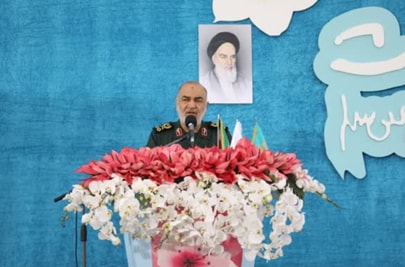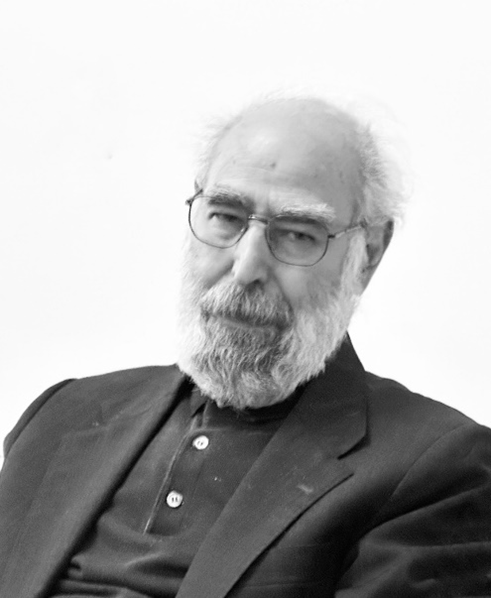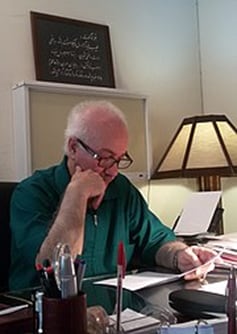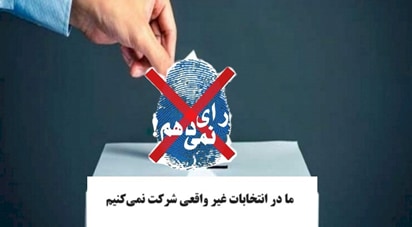Introduction
On the eve of the election in Iran for the Majlis, set for March 1, 2024, and the concurrent election for the Assembly of Experts, several reformist organizations have, as in years past, announced that they are boycotting both elections. The announcement comes despite the Iranian regime's pressure on the public to turn out to vote.
As in previous election cycles, because of the extensive disqualification of reformist candidates by the Guardian Council,[1] lack of transparency, and failure to run the country's affairs professionally and effectively, there is a high level of voter apathy. According to the Iranian Interior Ministry itself, the average voter turnout countrywide for the previous Majlis election in 2020 was less than 50%; in Tehran, it was only 26%.[2]
This report will discuss calls by reformist organizations and leaders to boycott the Majlis and Assembly of Experts elections.
Iranian Regime Officials: Failure To Vote Means "Supporting The Enemy"
The Iranian regime seeks to publicly present high voter turnout because this will allow it to claim that it has the support and legitimacy of the people. However, officials' statements in recent weeks indicate apprehension about public apathy, or even about an intention to boycott the elections as an act of protest.
Senior Iranian regime officials have urged the public to vote. Iranian Supreme Leader Ali Khamenei called the elections "the central backbone of the Islamic Regime of Iran and the right way for change and reform in the country," stating that everyone needs to participate. Ignoring the millions-strong Green Movement protests that erupted in 2009 as a response to election fraud and the appointment of Mahmoud Ahmadinejad as president, Khamenei said: "Throughout the past decades, we have never seen fraud in [Iranian] elections."[3] The director of Khamenei's office, Alireza Panahian, even described voting as "a move towards the appearance of the Mahdi [the Shi'ite Messiah]."[4]
Hossein Shariatmadari, editor of the regime mouthpiece, the Kayhan daily, stated on February 24 that failure to vote means "supporting the enemy." He wrote: "Permit me to say frankly that 'being mad' at the ballot box and not voting means supporting the enemy as well as opposition to the revolution – the same enemy who mobilized all its power to prevent [Iran's] citizens from voting." Like other regime officials, Shariatmadari attributed the voter apathy among the Iranian public to "the many efforts of the foreign media, the enemies, and some 'among us'" – meaning the reformists in Iran.[5]
IRGC commander Hossein Salami attempted to fire up the voters in a February 24, 2024 speech. He called voting an operation against the enemies who seek to dissuade Iranians from participating in the elections, and added that voting in the upcoming elections will be "the most glorious political epic."
He said: "We are advancing towards another political epic next Friday [Election Day]... The enemies of Islam use all their power to deter the citizens from coming to the ballot box. This is a political battle between us, who want elections and Islam, and the enemies, who want to separate us from Islam. The enemies want to force upon us their desire to implement their political action. I say to them that in the upcoming war [Election Day], we will present the most glorious political epic with a mighty fist in their mouths."[6]

IRGC commander Hossein Salami (Source: Fars, February 24, 2024)
Reformist Organizations And Leaders Call For Boycotting The Elections
One prominent reformist organization that called for boycotting the elections was the National Front of Iran, the country's largest secular, pro-democracy group that was established in 1949; it is chaired by Sayyed Hossein Mousavian. Members of the National Front include the Iran Party, the Iranian People's Party, and the Social Democratic Party of Iran.
On February 22, 2024, the National Front announced on its website that it was boycotting the upcoming elections, calling them "fraudulent." Its statement stressed that the main conditions essential for holding true elections included the freedom to establish political parties, freedom of assembly, freedom of the press and media, and the right to vote and to run for office – and that none of these conditions were being met in Iran under the Islamic Republic. (See translation of the National Front statement below).
In its announcement, the National Front focused on the sweeping disqualification of candidates, most of them from the reformist camp and including even senior officials in the previous government of President Hassan Rohani. Guardian Council spokesman Hadi Tahan-Nazif said on February 29, 2024 that some 30% of candidates for the Majlis election had been rejected; however, this number could be higher.[7] Most of those who were disqualified were reformists, and they included 22 currently serving Majlis members who are frequent critics of the government.[8]
It should be noted that the previous president Hassan Rohani, former intelligence minister Heydar Moslehi, and Mehdi Taeb, who is director of the extremist-ideologue-affiliated Ammar Strategic Advisory Base, apparently with the aim of giving an appearance of balance,[9] are among the disqualified Assembly of Experts candidates.[10] The disqualification of senior figures who are today in the heart the regime exemplifies the drastic moves being made by Khamenei and the ideological camp to hold onto their power.
Other reformist activists too, such as Abolfazl Qadiani and Mostafa Tajzadeh, have called for boycotting the elections. Qadiani, who was a former political prisoner detained following the 2009 Green Movement protests and was one of the founders of the Hamujahadin (Fighters) of the Islamic Revolution organization, described the elections as "an engineered show" and called on all those who seek freedom and justice and oppose the regime of the Islamic Republic of Iran to boycott them.
In a harsh attack on Khamenei, Qadiani called him "Iran's power-loving and shrewd dictator" and said that he is "trying to pretend that, first of all, in Iran there is no dictatorship in Iran, no suffocation [of the Iranian public], no looting, and no oppression, and that the state is run democratically, and second, that his tyrannical regime is legitimate." He added that Khamenei "knows that the Iranian people see him as their greatest enemy, and consider his rule to be illegitimate, unelected, and usurping."[11]

Abofazl Qadiani (Source: Iranintl.com, February 21, 2024)
Former Majlis member Mostafa Tajzadeh, who was a minister in Khamenei's government and is now a political prisoner due to his criticism of the regime, wrote in a letter that most of the Iranian people have decided not to turn out to vote, ignoring the Iranian leader Khamenei and his propaganda and as a sign of protest against the miserable state of the country. Speaking out against Khamenei, Tajzadeh said that he had made it inevitable that the Majlis would fail, in light of his "taking away its powers," "establishing parallel legislative institutions," and "extensive disqualification of independent candidates." Tajzadeh went on to stress that Khamenei is closing his eyes to the "catastrophic reality in Iran" and is not listening to the protests of millions of Iranian citizens. He concluded his letter by stating that boycotting the elections was "the only path that the leader and his subordinates have left open for the Iranians, in light of the ongoing violation of the citizens' inalienable right."[12]
Statement By The National Front Of Iran: "We Do Not Participate In Fraudulent Elections"
SUPPORT OUR WORK

The following is the translation of the National Front's statement, titled "We Do Not Participate In Fraudulent Elections"

Sayyed Hossein Mousavian, National Front of Iran chairman
"In democratic societies, in which democratic standards are established and the citizens' basic and human rights are respected and protected, voting for representatives in the parliament is an arena in which members of the nation participate regularly and through which they determine the future of their society. By voting for a representative, they participate in charting the path and the method of their country's overarching policy. However, in order to achieve the people's participation in true, healthy, and fruitful elections, there are conditions that must be met, without which elections will be distorted and cannot be considered true and healthy.
"The main conditions required for true elections are the free presence of political parties and organizations with specific religious principles known to the people that are based in a text of society, freedom of assembly, freedom of the press and media, and respect for citizens' rights to vote and to be elected. However, under the rule of the Islamic Republic, not one of these conditions exist in Iran.
"In the absence of freedom of parties and assembly, in the absence of freedom of the press and media, and while not only critics and opponents of the regime but also former government officials are prevented from running for office, what is the point of voting? These elections are false from the ground up, and are far from meeting the standard of true elections.
"In the Islamic Republic [of Iran], a council appointed by the regime, the Guardian Council, gives the people a list of candidates who are obedient regime-affiliated emissaries and agents, and asks the people to vote only for those chosen by the regime. Can this ridiculous and misleading charade be called 'elections'?

Illustration for the National Front's statement; the ballot box reads "We do not participate in fraudulent elections"
"The members and supporters of the National Front of Iran have not and will not participate in such a scenario, which includes not even the smallest trace of true and free elections. We see all the crises of the country, and all the current suffering and problems of the Iranian people, and the overall poverty of society, as a result of the absence of free elections and of the people's inability to directly participate in their own destiny.
"Signed,
"The leadership of the National Front of Iran
"Tehran, February 20, 2024."[13]
110 Reformists Call For Boycotting The Elections And Voting For Moderate Candidates
On February 11, 2024, 110 Iranian reformist social and political activists, intellectuals, and media figures called for NOT boycotting the elections and for voting instead for moderate candidates. These activists included figures such as former Tehran mayor Gholamhossein Karbachi, former Majlis members Elias Hazrati. Ahmad Shirzad, and Elaheh Kulai, former Tehran city council members Majid Farhani and Behareh Ervin, journalist Hamid Reza Jalai Pour, and journalist, politician, and writer Shehad Aladin Tabatabai.[14]
This call came against the backdrop of a statement published by the Reform Front, the country's top reformist body that represents some 30 reformist parties and organizations. It is not submitting a list of candidates for the elections because of "the absence of suitable conditions" and because the elections are "neither competitive nor effective."[15]
The 110 reformists said that citizens should turn out to vote, even though they underlined that they were, "neither free nor fair," and added that there is currently a "process of aggressively purging candidates, more than in the past." They said that "decades of experience in elections in Iran and in other societies have shown that sanctions and refusal to vote are not effective tools for achieving free elections and that in most cases they... make the work of supporters of free elections harder in the long run."
They added: "It is by means of voting, by trying to strengthen the moderate power coalitions, and by reducing the number of extremist candidates that we can limit the damage being done to Iranian society by the decisions of the [elected] institutions, and by boosting the positive impact of their decisions."
Enumerating political and socio-cultural issues that had not been improved by Majlis legislation, they listed the "Strategic Operation" law concerning the nuclear issue aimed at accelerating uranium enrichment, ostensibly in order to get the sanctions on Iran lifted, but which had become an "obstacle to the U.S.'s return to the JCPOA"; the "Youth Law" that had caused "a waste of public resources... and disease and unwanted pregnancies among society's weaker sector"; and the "Modesty and Hijab Law" that had included penalties such as fines, business closures, and extensive restrictions on social freedoms. The reformists continued: "Reviving elections and increasing the Majlis's influence will not be achieved by reformists' quitting and by boycotting elections – which, ironically, will advance the 'purgers' and their success."
They noted: "The freedoms and implementation of rights are not just limited in elections. Unfortunately, they are [also limited] online (by means of filters and various security software), in newspapers and media (by means of licensing restrictions and other limitations), in universities and public institutions (by means of various quotas and security pressure), professional unions (by means of various restrictions), books and movies, music, theater and other arts (by means of various forms of censorship and regulation), in the street (by various means of limitations on peaceful gatherings), parties and nonprofit organizations (by means of various licensing restrictions and other limitations), national men's and women's sports (by means of various restrictions), formal courts of law (by means of pressure from officials and unjust laws), and in many areas of the economy and of organized civilian activities (by means of various monopolies and obstacles...
"These institutions, such as the online space, civilian institutions, and culture, are the shared property of all of Iran's citizens. The exclusivity and desire of the 'purgers' to turn them into an [empty] ritual is not a license for us to give up on our rights to participate [in the political process]... Forming a reformist majority in the Majlis is currently unattainable, [but] we can still try to form a good and effective minority... We must choose short-range achievable goals that suit the current capabilities of the reformists, of society, and of the government, and we must build broader capabilities and coalitions in order to achieve higher goals... Despite the decrease in the registration of quality candidates and despite all the unfair disqualifications, there are still moderate, healthy candidates who call for reform and who are participating in the race for dozens of seats in the [upcoming] 12th Majlis. Bringing more of them into the Majlis can increase the opportunities [for the reformists and] the supporters in Iran, and it can make a real difference in the approval of [candidates for] the next Majlis...
"We invite political and civil leaders and organizations that are moderate and reformist, as well as national figures, interest groups, intellectuals, online and real-world social media influencers, and civil and political activists to support the coalition of moderates in the 2024 elections (in the fields in which quality candidates remain). We invite the civilian public to vote for this coalition's candidates in these areas without giving up on their right to vote. By voting in protest and for opportunity, we can try to prevent extremist candidates from entering the next Majlis, by means of limiting the Majlis's negative impact on people's lives and increasing its positive role, creating a better foundation for the years to come."[16]
* A. Savyon is director of the MEMRI Iran Media Studies project; N. Katirachi is a Research Fellow at MEMRI.
Appendix: MEMRI Reports On Disqualification Of Thousands Of Candidates In Iranian Elections
Inquiry and Analysis No. 1502, The Recurring Scam Of Allegedly Democratic Elections In Iran: The 11th Majlis Elections – A Continuation Of Khamenei's Dictatorship Through His Councils, February 19, 2020
Special Dispatch No. 6282, Iranian Pragmatic Camp Leaders Protest Against Regime's Mass Disqualification Of Thousands Of Pragmatic Camp Candidates For February 2016 Majlis Elections, January 28, 2016
[1] The Guardian Council (Shura-e Nagabhan) has the authority to disqualify candidates whom the IRGC deems undesirable, and it has disqualified thousands for every election – for the presidency, the Assembly of Experts, the Majlis, and municipal posts, on a range of pretexts. After Ayatollah Ruhollah Khomeini, the father of the Islamic Revolution, came to power in 1979, it was set in the Iranian constitution that the Guardian Council's role was to ensure that there was compatibility between Majlis legislation and shari'a law, and that it had this authority of disqualifying candidates for the presidency and the Majlis. The council is a conservative body comprising six clerics appointed by Supreme Leader Ali Khamenei, and six jurists, all of whom he appoints as well. The criteria according to which the Guardian Council rules give it sufficient authority to disqualify any candidates it does not want.
[2] IRNA (Iran), March 1, 2020.
[3] ISNA (Iran), February 18, 2024.
[4] Aftab News (Iran), February 23, 2024.
[5] Fars (Iran), February 24, 2024.
[6] Fars (Iran), February 24, 2024.
[7] According to him, some 15,000 candidates were approved for the Majlis election. Tabnak, Iran, February 9, 2024.
[8] IRNA (Iran), February 18, 2024.
[9] The Ammar Headquarters, which Mehdi Taeb heads, was established on February 11, 2011, on Iran's Islamic Revolution Day, following the 2009 Green Movement protests in Iran, in response to Khamenei's instruction to his loyalists in the political and cultural elite to prevent a recurrence of the protests. Aimed at strengthening absolute obedience to Khamenei and to the principle of the Rule of the Jurisprudent, its 15 members are for the most part senior regime officials and prominent theoreticians in hardline ideological circles. Taeb's deputy is Alireza Panahian, a senior official in Khamenei's office who heads Khamenei's think tanks in Iranian universities. Other members are Saeed Ghasemi, former senior IRGC official and now a senior member in the hardline Iranian Hizbullah group, and Hassan Abassi, IRGC theoretician and head of the IRGC's Doctrinal Center for National Security.
[10] Entekhab (Iran), January 31, 2024.
[11] Telegra.ph, Iran, February 20, 2024.
[12] Tajzadeh has previously called for boycotting elections on the grounds that the Islamic regime is dictatorial, and has spoken out against Khamenei for persecuting those who oppose him and preventing freedom of expression and political and civil freedoms by means of the security apparatuses that do his bidding. He also warned that the end of the Islamic regime will be like those that preceded it – via popular revolution. See MEMRI Special Dispatch No. 7405, Iranian Regime Steps Up Its Repression Of Society Following The Popular Uprising Of December 2017 – Part I: Reformist Former Minister Tajzadeh, Reformist Website Slam Leader Khamenei For Suppressing Individual And Civil Freedoms, Persecuting Opponents, March 29, 2018.
[13] National Front of Iran website Jebhemeliiran.org, February 22, 2024.
[14] Mehr News (Iran), February 11, 2024.
[15] Tasnim (Iran), February 17, 2024.
[16] Etemad (Iran), February 11, 2024.




